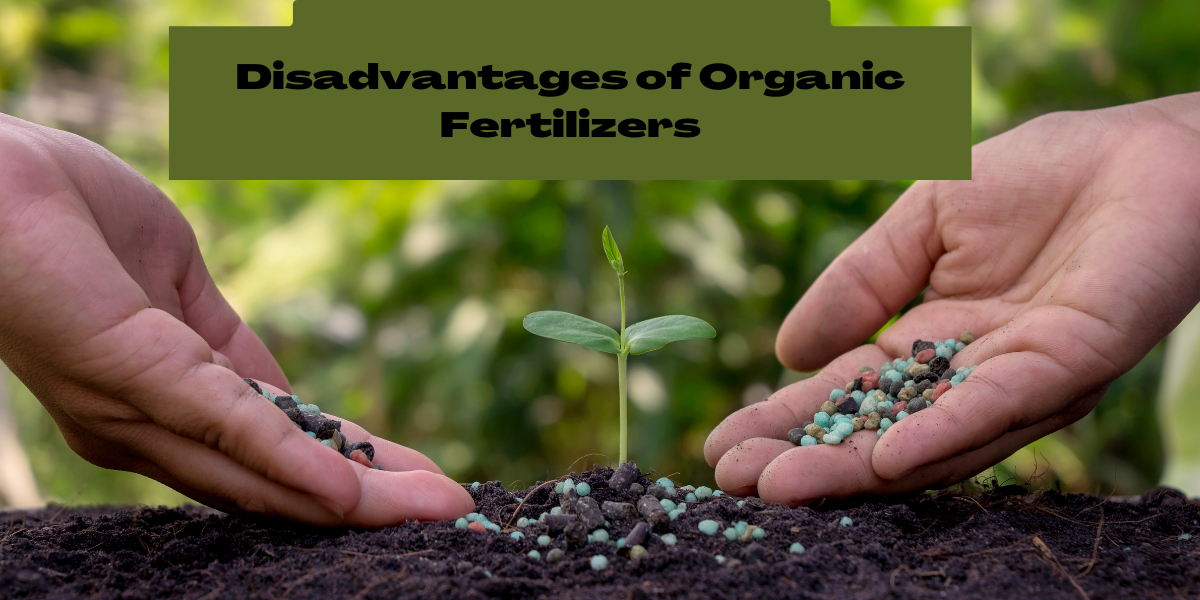Organic fertilizers are becoming increasingly popular among farmers and gardeners.
Organic Fertilizers are derived from plants or animals, including manure, compost, and blood meal. Although organic fertilizers are often touted as being more environmentally friendly than synthetic fertilizers, they have several disadvantages.
Here we will discuss six significant disadvantages of organic fertilizers that you should be aware of before using them. They are from the price concerning to their slow effects. So, without wasting any time, Let’s jump straight into the details!
Organic Fertilizers
Organic fertilizers are made from natural materials that improve the quality of your soil without the use of chemicals. They can be made from things like manure, compost, and other organic matter. Unlike chemical fertilizers, organic fertilizers don’t contain any synthetic ingredients.
They help to promote healthy growth in plants and can be used on both indoor and outdoor plants. They are available in different types, such as compost, manure, bone meal, mulch, dead leaves, and many other organic materials.
They are beneficial to the soil, for example, they improve soil health, and fertility and they are safe for the environment. However, there are some disadvantages of organic fertilizers that we mentioned below:
6 Disadvantages of Organic Fertilizers
The Effect is Slow
One of the biggest problems with organic fertilizers is that they can have a slow effect. This is because organic matter takes time to break down and release nutrients into the soil. It can take weeks or even months for organic fertilizer to work its way into the soil and provide nutrients to plants. This can be a problem if you need quick results, such as when trying to grow vegetables during a short growing season.
Additionally, they release nutrients slowly over time, which can lead to leaching and runoff. This can pollute waterways and harm aquatic life. Additionally, organic fertilizers can attract pests and diseases, which can damage crops. In contrast, synthetic fertilizers are designed to be quickly absorbed by plants, so they can get the nutrients they need right away.
They Have Lower Nutrients Level
Another problem is that they simply don’t have enough nutrients to really benefit plants. This means that plants can actually become quite stunted and unhealthy if they’re relying on organic fertilizer for nutrition.
The nutrient levels in organic fertilizers are much lower than in chemical fertilizers. This means that farmers have to use more organic fertilizer to get the same results as they would with chemical fertilizer.
The increased use of organic fertilizer can lead to environmental problems such as water pollution and soil erosion. The extra fertilizer can run off into waterways, polluting them with nutrients and chemicals. And, because organic fertilizer is less effective than chemical fertilizer, farmers may end up using more land to grow their crops. This can lead to soil erosion and habitat loss.
In addition, organic fertilizers can also introduce harmful bacteria and viruses into the soil. This can lead to serious problems for both plants and people.
They are More Expensive
Even though you may think they can be a better option, they are pricier than chemical fertilizers. This is because organic fertilizers must be made from natural materials, while chemical fertilizers can be made from synthetic materials.
Organic fertilizers must be sourced from reliable farmers who produce high-quality organic materials. The cost of sourcing these materials can be higher than the cost of sourcing synthetic materials for chemical fertilizers.
There are a number of reasons why organic fertilizers cost more than chemical fertilizers. First, organic farmers have to be certified by the United States Department of Agriculture (USDA). This certification process can be costly and time-consuming.
Second, organic farmers often use less-efficient methods of production, such as hand-hoeing or manual crop rotation, which can add to their costs. Finally, the market for organic products is still relatively small, so there is less competition among producers and higher prices for consumers.
The Effect is Limited
Organic fertilizers are also not good for your garden as they have limited effect. There are a few reasons why organic fertilizers may not be as effective as some people think. First of all, they often contain lower levels of nutrients than chemical fertilizers. This means that they need to be applied more often to achieve the same results.
This can be a problem if you have limited space in your garden. Organic fertilizers also take longer to decompose than chemical fertilizers, which means they don’t release their nutrients as quickly. This is not good if you are trying to combat a plant disease quickly.
Another reason is that organic matter can bind with soil particles, making it difficult for plants to uptake the nutrients. This can be especially true in clay soils. Clay soils are very dense and they don t allow water, air, and nutrients to penetrate very easily. Organic matter will tie up the nutrients in clay soil and make it even more difficult for plants to access them.
Finally, microbes in the soil can compete with plants for the available nutrients in organic fertilizer, meaning that less is available for plant growth.
The Results are Inconsistent

Their inconsistency is another reason to avoid them. A new study suggests that organic fertilizers may not be as consistent in their results as previously thought.
The study, conducted by researchers at the University of California, Davis, found that organic fertilizers can produce inconsistent results depending on the source of the materials used to make them. For example, manure from different animals can have different levels of nutrients, which can impact how well the fertilizer works.
This inconsistency can be a problem for farmers who rely on organic fertilizers to improve crop yields. The study’s authors say more research is needed to better understand how organic fertilizers work and to develop ways to make them more consistent.
There are a number of factors that can contribute to the inconsistent results of organic fertilizers. One is the nature of the materials used to make them. Organic fertilizers are typically made from manure, compost, or other natural materials, all of which can vary in quality and composition. This can make it difficult to achieve consistent results.
Another factor that can affect the results of organic fertilizers is how they are applied. An inconsistent application can lead to uneven results, with some areas receiving too much fertilizer while others receive too little. This can be especially problematic when trying to achieve specific goals, such as increasing crop yield or improving soil health.
Can Have Pathogens
Lastly, organic fertilizers are often made from manure or compost, which can contain pathogens. These pathogens can cause diseases in plants, animals, and humans. Some of the diseases that can be caused by pathogens in organic fertilizers include E. coli infections, salmonella infections, and legionnaires’ disease.
Pathogens can also contaminate food crops and cause foodborne illnesses. There are several ways to prevent pathogens from contaminating organic fertilizers, including proper storage and handling of manure and compost, and regular testing of products for pathogens.
Conclusion
There are several disadvantages of organic fertilizers. They can be more expensive than synthetic fertilizers, they can be less effective, and they can take longer to break down. Additionally, organic fertilizers can attract pests and diseases, and they can be difficult to find. So, if you are considering using organic fertilizers in your garden, it is advised to take these drawbacks into consideration.

